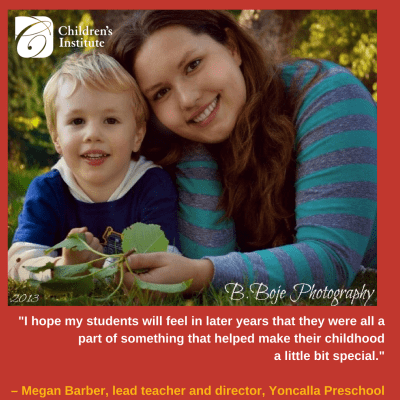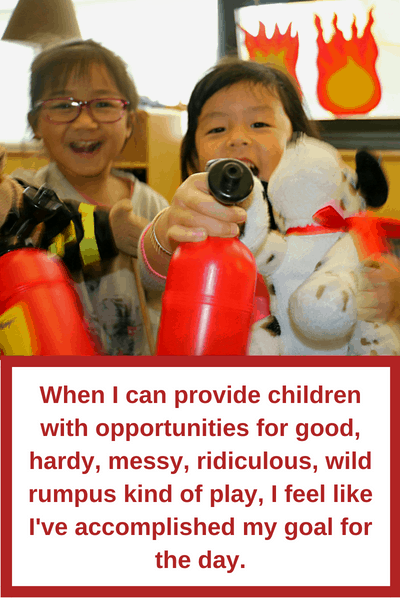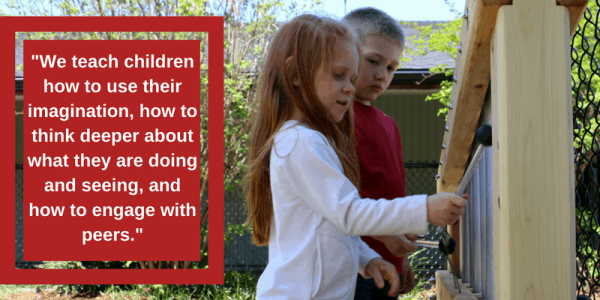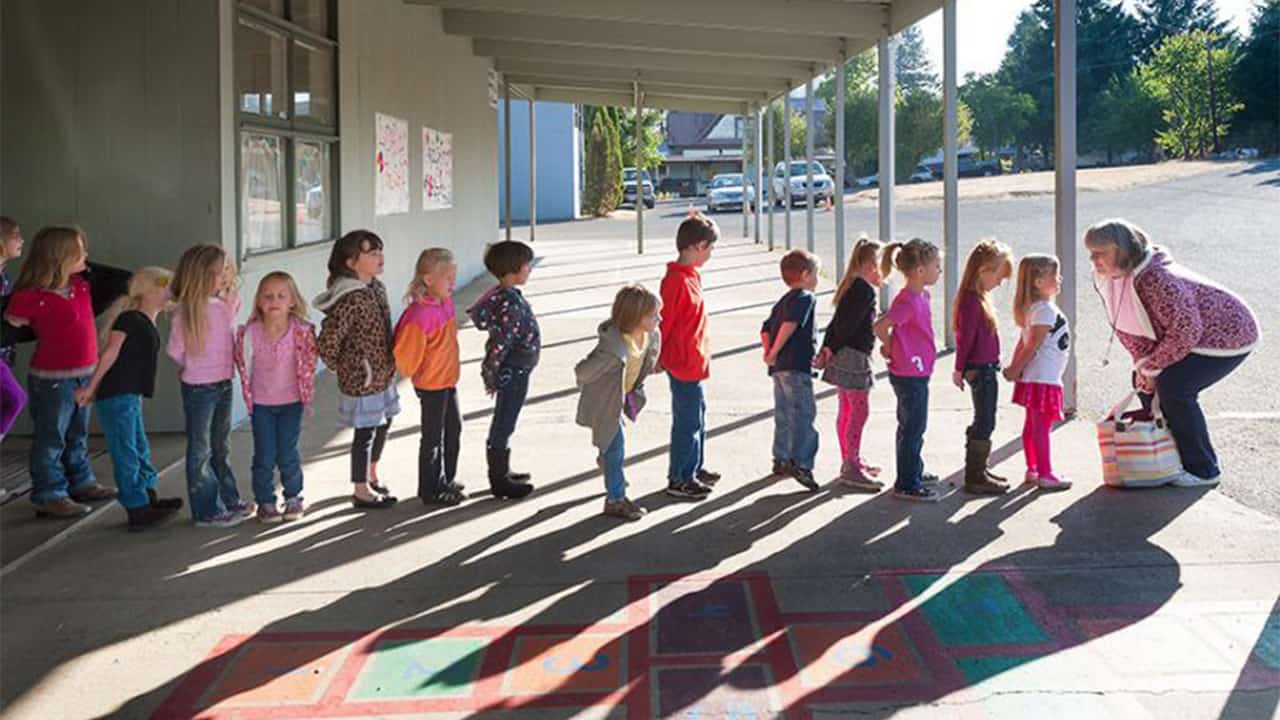
This summer Children’s Institute is highlighting the important work of early childhood educators teaching preschool through third grade. In this series of profiles, teachers from across the state tell us why they teach young children, what they wish people knew about their work, and what they’ve learned in their jobs.
Megan Barber Shares Her Work Creating a Playful, Safe, and Loving Preschool Classroom
Megan Barber is the lead teacher and director of the preschool program at Yoncalla Elementary School. Yoncalla is a town of just over a thousand people in rural Douglas County, Oregon. The program is a Preschool Promise site offering publicly funded preschool to children in low-income families living in the district. Yoncalla Elementary School is also part of the Early Works initiative, a prenatal through third grade learning lab demonstrating a new approach to education and healthy development for young children and their families.
Why do you teach preschool?
Most things that have happened in my life have not been planned out but have been more like tripping over buried treasure. I chose my professional path for my undergraduate work by chance, I got involved in preschool work at the Family Relief Nursery (a child abuse prevention agency) by chance, and even finding a home within the community I now work in was not necessarily a part of the plan. Since preschool is not actually part of the elementary school system in Oregon, I never looked at it as a viable career path. However, when a part-time preschool teaching position came up at the Relief Nursery (something I found out by chance when my dad was doing a water damage job at the facility), I said, “why not?” and applied for the job—not thinking much would come from it. My life forever changed when I took that position. Through this work, I got to take a close examination of the families within my community, developing a love and empathy for their unique situations and challenges. I quickly realized that these marginalized families were invisible within the community and lacked any voice or ability to advocate for the needs of their children. I decided from that moment on that no matter what future teaching position I took, the families (especially the invisible families) would come first. I love preschool because I have the opportunity to be the first educational experience for the family as a whole within the community and I will do everything in my power to help it be positive and welcoming—starting parents on their first steps towards being leaders in the school and advocates for their children.
 I will also admit, I’m deeply in love with preschool because I get to play. It was shocking to me that I had forgotten how to play—silly, crazy play—like children do. Learning real play again became a study of mine, something I practice and invest in. You see, play is where the magic is. Anything can happen for children in play! And when I can help provide children with opportunities for good, hardy, messy, ridiculous, wild rumpus kind of play, I feel like I’ve accomplished my goal for the day. What was so strange to me was realizing that some of the children coming into the classroom forgot how to play. That is all the more reason why play is an absolute necessity, because it creates a space where children bloom and come into their own. We teach children how to use their imagination, how to think deeper about what they are doing and seeing, and how to engage with peers to make their experience more fun.
I will also admit, I’m deeply in love with preschool because I get to play. It was shocking to me that I had forgotten how to play—silly, crazy play—like children do. Learning real play again became a study of mine, something I practice and invest in. You see, play is where the magic is. Anything can happen for children in play! And when I can help provide children with opportunities for good, hardy, messy, ridiculous, wild rumpus kind of play, I feel like I’ve accomplished my goal for the day. What was so strange to me was realizing that some of the children coming into the classroom forgot how to play. That is all the more reason why play is an absolute necessity, because it creates a space where children bloom and come into their own. We teach children how to use their imagination, how to think deeper about what they are doing and seeing, and how to engage with peers to make their experience more fun.
The other thing I love about children at this age is that they really don’t remember anything about preschool. When children grow up, they cannot recall the letters they learned, the numbers they wrote, and they may not even be able to clearly remember the faces of the teachers they had. What is left behind is this feeling, whether it was a great feeling or a not so great one. I hope my students will feel in later years that they were all a part of something that helped make their childhood a little bit special. Maybe we can all walk away with the feeling of being touched by a little pixie dust.
What is one thing about your job that you wish other people knew?
I wish people could really see the work that my staff and I do together. Not only do we train together, purposefully build our skills and philosophy together, and communicate frequently—we work like a well-oiled machine. Rarely needing to actually say a word about what is needed, we can pretty much read each other’s minds in order to be where we need to be, identify a need of a student, assess what is to be done when a situation arises, or how to be flexible or change plans on the fly. My three teacher aides are what makes the program work as it does. They invest in the mission just as I do, they see it work, they are honest about what needs to change, and they give everything they’ve got. For us, this is not a job—it is something we are called to do. And when you have a group of people who are dedicated to children and families, I just don’t think that there is anything we can’t do!
On the same note, I think it is only logical to state that we work so well and push so hard to do our best because teaching preschool is much harder than many think it is. Yes, we get to play—but play is actually hard work. We are right alongside the children, helping them plan, problem solve, engage, be responsive; we are scaffolding, observing, and assessing. When children come in, they have their own anxiety and stress that they bring through the door and we work so hard to download our calm, to make their burdens light. Our days feel long sometimes, our feet are tired, and we are probably pretty gross when all is said and done. Working in preschool is not for everyone because it is some intense, powerful work when done right. In other words, we should all give props to the preschools and their staff. The work is hard but rewarding.
“Teaching preschool is much harder than many think it is. Yes, we get to play- but play is actually hard work.”
Can you describe a learning experience you’ve had that has impacted your teaching?
I have been very fortunate to work in the field of trauma, which has opened my mind to better understanding my community and the children I serve. Through my education, I have learned so much about best practices, how to refine my work to best meet the needs of all students, and how to provide an inclusive environment. It feels like everything I learned was tied together last summer, when I took a week-long training in Arkansas to learn about Dr. Becky Baily’s work in Conscious Discipline. (She is now my personal hero.) I knew that her work in social and emotional development was the key that had been missing in my practice. Even though I had the education behind me regarding trauma, special needs, best practice, therapeutic language, brain development, etc., I had been missing the practical application of this knowledge in a way that works best for children. Though there’s still so much more for me to learn, I couldn’t help but dive in the moment school started. I designed a safe space within my classroom that was a purposeful place for me to talk with students about our emotions and how they can co-regulate. I trained my staff on what this looks like, so we can all engage with children in a way that is nurturing rather than punitive. I made sure that each child has a choice in how they want to be greeted and engage in “I love you” rituals for children walking into the classroom with anxiety, stress, fear, or sadness. We bond each morning with a unity song that emphasizes how we love and care about each person in our school family and how we will keep it safe for each other. The students now know how to show empathy for each other, leading their own “Wishing Well” experience for children who are upset or needing help. The students themselves have become the nurturers for each other and have truly embraced the idea of family. I love the concept of creating this family and unit within the school because it fills in the gaps that children experience within their home life—fully meeting the needs of each child.
What I especially love about Conscious Discipline is how appropriate it is for all children (heavens, it meets our needs as adults, too). Many autistic children learn specific facial expressions so that they can better identify what another person’s experiencing emotionally. Children with behavioral issues (who are frequently kicked out of preschool programs) learn how to be able to calm, use their words to express their needs, and have “loving eyes” for others so that they see from their perspective. Children who have experienced trauma (which is more of the norm than the exception in my classroom) can have their fragile hearts addressed and cared for and are provided the safety of being able to express themselves in a way that is safe but also meets the needs of the child and the family. Conscious Discipline also engages parents to take part in the school family and practice the language and purpose of the method to benefit children when at home. It is a healing experience for families. There is no way to experience the practice and not walk away unchanged. Conscious Discipline is a heart thing. It is a love thing. This is how we raise children to change the world.


